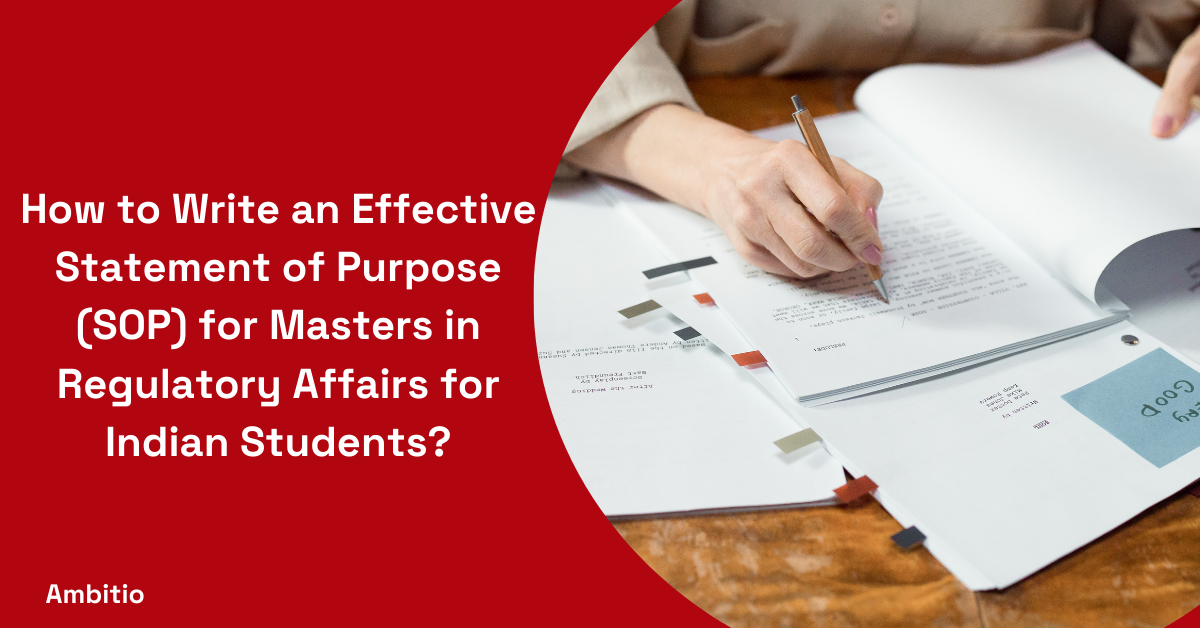30 April 2025
6 minutes read
How to Write an Effective Statement of Purpose (SOP) for Masters in Regulatory Affairs for Indian Students?

Key Takeaways:
- Statement of purpose for masters in regulatory affairs should align your academic background and career goals with the program’s strengths.
- Highlight your knowledge of regulatory processes, pharmaceutical sciences, and practical training to make a strong case.
- Research top universities offering regulatory affairs programs and tailor your SOP to match their curriculum with your professional goals.
The demand for skilled regulatory affairs professionals is at an all-time high, particularly in the pharmaceutical and biomedical sectors, as regulatory requirements become increasingly complex. However, Indian students often face the challenge of crafting a compelling statement of purpose for masters in regulatory affairs, as they struggle to balance academic achievements with real-world experience in global regulatory frameworks.
To stand out in a competitive field, it’s crucial to showcase not just your knowledge of regulatory compliance and clinical trials, but also your career aspirations and how the graduate program in regulatory affairs aligns with your professional goals. By focusing on your unique experiences in pharmacy, quality assurance, and clinical research, you can effectively demonstrate why you’re ideally suited to study at an esteemed university and become a key player in ensuring the safety and efficacy of pharmaceutical products.
Importance of SOP for Indian Students Applying to Regulatory Affairs Programs
For Indian students applying to regulatory affairs programs, the statement of purpose (SOP) plays a critical role in showcasing your commitment to pursuing a master’s degree, such as an MS in regulatory affairs. As the pharmaceutical industry continues to expand globally, the demand for skilled professionals with expertise in drug safety, risk management, and regulatory science is increasing. Your SOP allows you to demonstrate your interest in regulatory affairs, your background in pharmaceutical sciences and research, and how the program ideally suits your professional goals.

A well-crafted SOP for masters in regulatory affairs can highlight your academic achievements, such as a degree in pharmacy or B.Pharm, along with your knowledge of regulatory processes, quality control, and GMP standards. It’s also your opportunity to emphasize your practical training in medical devices, pharmaceutical chemistry, and clinical trials. By aligning your career goals with the curriculum and research strengths of the program, you can enhance your chances of being accepted into the program and studying at your esteemed university, ultimately preparing you for success in the global pharmaceutical sector.
Key Elements to Highlight in Your SOP for Masters in Regulatory Affairs
When crafting your statement of purpose for masters in regulatory affairs, it’s crucial to highlight key elements that not only align with your academic and professional background but also reflect your aspirations in the regulatory field.

A strong SOP demonstrates why you’re ideally suited for the program, showcasing both your qualifications and how the program will enhance your academic and career goals. Here are the key elements to include:
- Introduction and Motivation: Begin by discussing your interest in regulatory affairs, particularly how your undergraduate studies in life sciences or a degree in pharmacy (B.Pharm) have prepared you for graduate study in this field.
- Academic Background: Highlight your rigorous academic foundation, especially in subjects like pharmaceutics, science, mathematics, and any other relevant coursework that showcases your knowledge in pharmaceutical sciences and research.
- Relevant Skills: Emphasize the skills necessary for success in regulatory affairs, such as analytical skills, understanding of pharmaceutical regulations, and familiarity with regulatory agencies. This will show you have a solid base for further learning in the program.
- Career Goals and Alignment: Clearly state your short-term goals, such as working in pharmaceuticals and healthcare, and explain how the Master of Science (M.S.) program will help you achieve them. Align your aspirations with the program’s curriculum, its flexibility, and its focus on the global demand for regulatory professionals.
- Why This Program: Discuss why this particular program is ideally suited to your professional goals. Mention the faculty, the opportunity for practical training, and how the curriculum will equip you with the necessary knowledge to contribute to the pharmaceutical sector, ensuring safe and effective drugs.
- Community Fit: Demonstrate how you fit into the student community at the university, referencing letters of recommendation or any collaborative experiences that prove your potential to thrive in a rigorous academic environment.
- Closing Statement: Conclude by reasserting how the program will enhance your academic journey and prepare you for a successful career in regulatory affairs, allowing you to contribute to the safety and efficacy of pharmaceutical products globally.
Tips for Indian Students to Write a Standout SOP in the Admissions Process
Writing a standout statement of purpose for masters in regulatory affairs can be a game-changer for Indian students aiming to gain admission to a top-tier program. The SOP is your chance to showcase your passion, knowledge, and skills while aligning your career goals with the program’s strengths. Here are some tips to help you craft a compelling SOP:
- Start with a Strong Introduction: Your personal statement should open with a clear expression of why you’re interested in regulatory affairs. As an Indian student with a bachelor of pharmacy (B.Pharm), connect your foundational knowledge of pharmaceuticals and healthcare to your desire to enhance your understanding of regulatory science.
- Highlight Relevant Academic and Professional Background: Be sure to mention how your background in science and mathematics has equipped you with the analytical skills necessary for graduate education in regulatory affairs. Reference specific subjects or experiences that have prepared you for this master’s program.
- Align with Career Goals: Demonstrate that this program is ideally suited to your professional goals. Explain how the program’s flexibility of the curriculum will help you achieve your aspirations in the regulatory field, particularly in pharmaceuticals and healthcare, focusing on drug safety, regulatory compliance, and risk management.
- Showcase Knowledge and Skills: Emphasize the knowledge and skills you’ve gained during your undergraduate studies, such as understanding of regulatory agencies and their processes. This will prove that you’re already equipped with a solid foundation for your graduate education in regulatory affairs.
- Fit with the University: Highlight how you’re a good fit for the student community at your university. Discuss the university’s resources, research opportunities, or faculty that will support your growth in this field. This shows that you’ve researched the program and are genuinely interested in joining their academic community.
- Professionalism and Clarity: Keep your SOP concise and clear. While submitting a PDF file may be the format of submission, ensure that your statement is well-structured, free from grammatical errors, and speaks to the admissions committee with clarity.
By following these tips, you can ensure that your SOP for a master’s in regulatory affairs stands out and resonates with the admissions team, ultimately increasing your chances of being accepted into the program.
10 Top Universities to Study Masters in Regulatory Affairs
Masters in Regulatory Affairs is an increasingly sought-after program as the global demand for skilled professionals in the pharmaceutical, medical devices, and biotechnology industries continues to rise. Regulatory affairs professionals play a crucial role in ensuring that medical products comply with government regulations, a key factor in bringing safe and effective products to market.
Here are 10 top universities where you can pursue a Master’s in Regulatory Affairs, along with key details about tuition fees, average salary post-graduation, and the exams required for admission:
| University | Average Tuition Fees | Average Salary (Post-Graduation) | Exams Required |
|---|---|---|---|
| University of Southern California | $45,000 | $80,000 | GRE, TOEFL/IELTS |
| George Washington University | $40,000 | $85,000 | GRE, TOEFL/IELTS |
| Northeastern University | $35,000 | $75,000 | GRE, TOEFL/IELTS |
| Johns Hopkins University | $50,000 | $90,000 | GRE, TOEFL/IELTS |
| University of California, Berkeley | $50,000 | $85,000 | GRE, TOEFL/IELTS |
| Temple University | $30,000 | $70,000 | GRE, TOEFL/IELTS |
| University of Florida | $40,000 | $78,000 | GRE, TOEFL/IELTS |
| Regis University | $35,000 | $72,000 | GRE, TOEFL/IELTS |
| The University of Sydney | $45,000 | $80,000 | GRE, IELTS |
| King’s College London | £20,000 | £60,000 | GRE, IELTS |
Conclusion
Your statement of purpose for masters in regulatory affairs is your opportunity to showcase your academic journey, career goals, and passion for ensuring the safety and efficacy of pharmaceutical products. For Indian students, it’s crucial to highlight your relevant experiences in pharmaceuticals and health care while aligning your aspirations with the program’s strengths. Crafting a compelling SOP can significantly boost your chances of admission to top programs.
To streamline your application process and get expert guidance, visit Ambitio and take advantage of personalized SOP support to maximize your chances of success in regulatory affairs programs.
FAQs
What should I include in my SOP for a master’s in regulatory affairs?
Include your academic background, relevant experience, motivation for regulatory affairs, and career goals.
What structure should my SOP follow?
Use a clear introduction, detailed body with experiences and goals, and a concise conclusion.
Should I include all my personal details or family background?
No, only include information relevant to your academic and professional profile.
How much work experience should I mention?
Mention only work experience related to regulatory affairs or transferable skills.
Is it appropriate to mention the need for a scholarship in my SOP?
Generally, no-unless specifically requested by the university.
What common mistakes should I avoid in my SOP?
Avoid false info, clichés, irrelevant details, and poor structure or grammar.
How can I make my SOP stand out for regulatory affairs?
Show clear understanding of the field and link your experiences to your career goals.

You can study at top universities worldwide!
Get expert tips and tricks to get into top universities with a free expert session.
Book Your Free 30-Minute Session Now! Book a call now




























